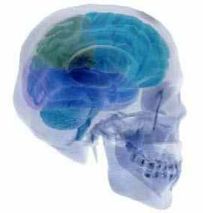25 top neurotheology research topics
 I’ve chosen to celebrate the first anniversary of Numenware—thanks to all my avid readers for their support—with a list of 25 top neurotheology research issues, along with an index to posts that relate to each topic.
I’ve chosen to celebrate the first anniversary of Numenware—thanks to all my avid readers for their support—with a list of 25 top neurotheology research issues, along with an index to posts that relate to each topic.
- Meditation. What are the short- and long-term effects of meditation of brain function and structure? (How meditation improves brain function, Meditate and thicken your cortex, Two types of meditation, two types of brain patterns?, Meditation stabilizes perception)
- Transcendental experience. What are the neurological analogs of transcendental experience—for instance, a particular balance between the sympathetic and parasympathetic nervous systems?
- Mental illness. Can we map the relationship between religious-themed behaviors on the part of mentally ill people such as schizophrenics and “normal” religious behavior to the neurological factors underlying that mental illness?
- Brain pathology. Can we correlate changes in religious behaviors with neuroarchitectural changes and pathologies, such as lobotomies? (Lobotomobile, Religion in the minimally conscious)
- Hallucinogens. Can we correlate religious-like behaviors that arise under the influence of hallucinogens with the know neurochemical effect of such substances? (Freedom of neuroreligion, Supremes OK getting high at church, LSD’s Albert Hoffman on the colorless substance of reality )
- Age. Can we correlate the development of “religious” belief (belief in the supernatural and/or afterlife) with the development of the brain in children? ) Is there a neurological correlate to the fact that major religious leaders have had their ephiphanies in their thirties? (Studying children’s belief in the afterlife, Developmental neurotheology, Neurological basis of average age of enlightenment)
- Species. Can we correlate the difference between primates’ primitive religious behaviors (or those of other advanced mammals) and those of humans with our knowledge of how the human brain has developed over theirs? (Neurozootheology)
- Gender. How do men and women differ in religious belief and behavior, and can we establish a correlation between that and how they differ in brain structure? (Neurotheology of gender)
- Polytheism. Can we correlate the difference between monotheistic and polytheistic beliefs with neurological factors?
- Motor systems. Do “religious people”—in particular meditators—have identifiable differences in motor functioning which can be related to brain structure? (Motor systems, Mirror neurons and neurotheology)
- East vs. West. Can a relationship be found between known differences in brain structure and function in Occidentals vs. Orientals and the types of religious beliefs and behaviors that have emerged in West and East?
- Agent hypothesis. Can we design experiments to prove the hypothesis that belief in God is a “spandrel” or “exaptation” of natural selection for a bias for humans to see agency in the world? (Is God an accident?, Why do humans believe in religion?, Pascal Boyer on neurotheology)
- Dreaming. What is the correlation between experiences of God or the supernatural while dreaming vs. while awake and known differences in neurological processing in the two states? (Dreaming of God)
- Hypnosis. Is religious belief a form of, or share mechanisms with, hypnosis? (Hypnosis and cognitive processing)
- Music. Religious ceremony often involves music, and music may evoke religious feelings; meaning that the neurology of music may be able to provide insight into the neurology of religion. (Neuromusicology , Mozart effect II, Religious music in your brain)
- Zen. Can we find neurotheological references in historical Buddhist literature such as the writings of Dogen? (The sound of one hemisphere clapping)
- Genetics. In addition to historiocultural, “meme”-like factors underlying religion, could there be specific genetic factors as well, such as ones that might predispose certain people to religious behavior or belief? (Gautama’s Darwinian boost, The Mystical Mind)
- Aliens. Could belief in aliens or UFOs share an underlying neurological mechanism with the belief in God or the supernatural? (What is it like to believe you were kidnapped by an alien?)
- Fringe phenomena. Are phenomena such as possession and stigmata real, and if so can we understand their neural basis? (Neurology of possession , Stigmata)
- Emotions. Emotions are a hot area in neuroscience; can we relate the knowledge gained to religious emotions, such as love of God? (Neuroscience of divine love)
- Near-death experiences. What is the neurology underlying NDEs and how does it connect to the fact that they often involve religious imagery? (Adaptive value of near-death experiences
- Speaking in tongues. What are the neural mechanisms related to glossolalia, and how are they related to neurology known to be religiously relevant?

April 19th, 2006 at 01:59
Readers here may be interested to know about an experiment in applied evolutionary neurotheology called Matrixism. As some of you might have guessed from its name it is a religion based on the movie The Matrix. It incorporates entheogens ina sound way and is a direct application of the principles of evolutionary neurotheology.
The web site for Matrixism is:
http://www.geocities.com/matrixism2069
November 30th, 2009 at 16:17
[…] week, I proposed 25 research topics for neurotheology L.A. Confidential buy . The underlying theme was to find phenomena somehow related to […]